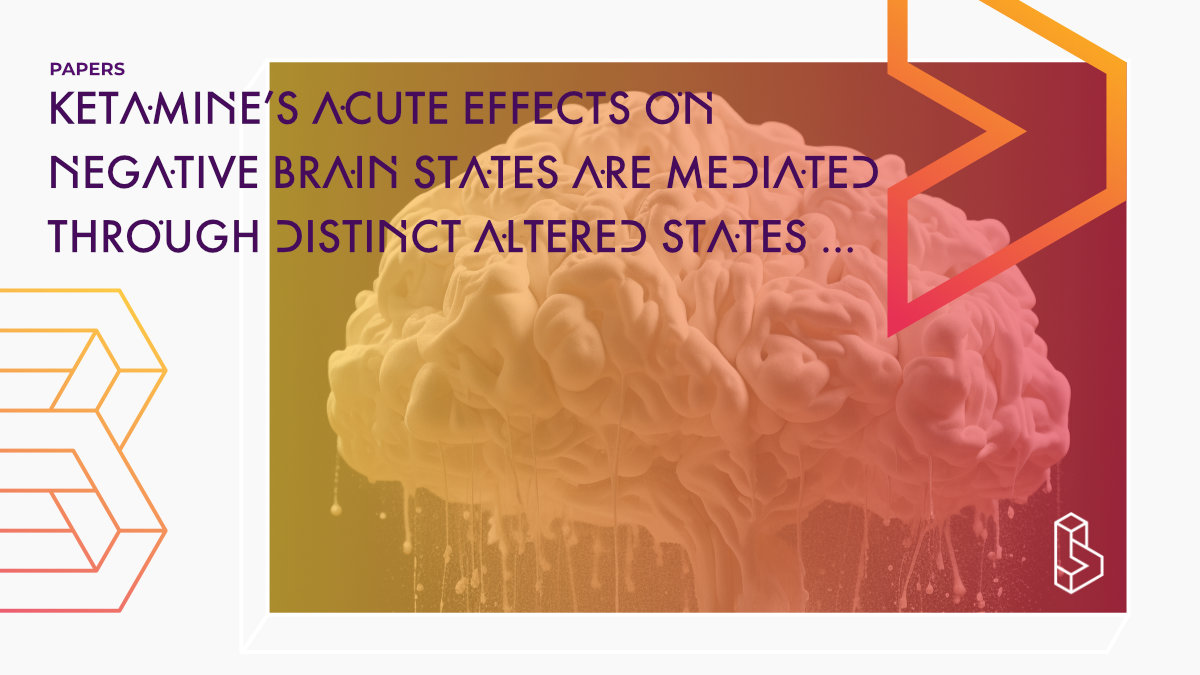This placebo-controlled study (n=13) investigated the effects of ketamine (3.5-35mg/70kg) on altered states of consciousness (ASCs) and their neural mechanisms. It examined the impact of different doses of ketamine on emotional task-evoked brain activity and various components of dissociation and ASCs. The study found that ketamine-induced ASCs had differential effects on brain activity, with higher depersonalization relieving negative brain states, while dissociative amnesia exacerbated insula activity. These results may provide insights into how specific dissociative states predict the response to ketamine in individuals with depression.
Abstract of Ketamine’s acute effects on negative brain states are mediated through distinct altered states of consciousness in humans
“Ketamine commonly and rapidly induces dissociative and other altered states of consciousness (ASCs) in humans. However, the neural mechanisms that contribute to these experiences remain unknown. We used functional neuroimaging to engage key regions of the brain’s affective circuits during acute ketamine-induced ASCs within a randomized, multi-modal, placebo-controlled design examining placebo, 0.05 mg/kg ketamine, and 0.5 mg/kg ketamine in nonclinical adult participants (NCT03475277). Licensed clinicians monitored infusions for safety. Linear mixed effects models, analysis of variance, t-tests, and mediation models were used for statistical analyses. Our design enabled us to test our pre-specified primary and secondary endpoints, which were met: effects of ketamine across dose conditions on (1) emotional task-evoked brain activity, and (2) sub-components of dissociation and other ASCs. With this design, we also could disentangle which ketamine-induced affective brain states are dependent upon specific aspects of ASCs. Differently valenced ketamine-induced ASCs mediated opposing effects on right anterior insula activity. Participants experiencing relatively higher depersonalization induced by 0.5 mg/kg of ketamine showed relief from negative brain states (reduced task-evoked right anterior insula activity, 0.39 SD). In contrast, participants experiencing dissociative amnesia showed an exacerbation of insula activity (0.32 SD). These results in nonclinical participants may shed light on the mechanisms by which specific dissociative states predict response to ketamine in depressed individuals.”
Authors: Laura M. Hack, Xue Zhang, Boris D. Heifets, Trisha Suppes, Peter J. van Roessel, Jerome A. Yesavage, Nancy J. Gray, Rachel Hilton, Claire Bertrand, Carolyn I. Rodriguez, Karl Deisseroth, Brian Knutson & Leanne M. Williams
Summary of Ketamine’s acute effects on negative brain states are mediated through distinct altered states of consciousness in humans
Racemic ketamine, a non-competitive antagonist of the N-methyl-D-aspartate glutamate receptor, has been used as an off-label therapy for treatment-resistant depression (TRD) since the 2000’s and is also a promising therapy for substance use disorders, post-traumatic stress, obsessive-compulsive, and social anxiety disorders.
Ketamine used for psychiatric disorders can induce altered states of consciousness, which can cause unpleasant psychotomimetic experiences compared to placebo.
Ketamine acutely induces multiple changes in affective neural circuit activity. We used functional neuroimaging to test whether these affective neural changes are dependent on non-ordinary subjective experiences.
Find this paper
https://doi.org/10.1038%2Fs41467-023-42141-5
Open Access | Google Scholar | Backup | 🕊
Cite this paper (APA)
Hack, L. M., Zhang, X., Heifets, B. D., Suppes, T., van Roessel, P. J., Yesavage, J. A., ... & Williams, L. M. (2023). Ketamine’s acute effects on negative brain states are mediated through distinct altered states of consciousness in humans. Nature Communications, 14(1), 1-11.
Study details
Compounds studied
Ketamine
Topics studied
Neuroscience
Study characteristics
Placebo-Controlled
Double-Blind
Within-Subject
Randomized
Participants
13
Humans

